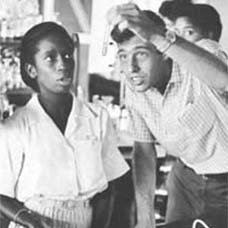
Jon Sleepy's Namibia Online Journal
Cultural Sharing
Okahandja
There is a group forming among the volunteers. I’m in my room writing this while the group is outside chilling. My main reason is being tired - I’m going to go to sleep after I write this, but I am actually glad to be by myself. I am wary of groups – too much time spent in a group atmosphere can take precedent over the individuals’ common sense. The Peace Corps attracts open-minded people, but I wonder if soon some open-mindedness will give way to rash judgments since we are living in such close quarters and are all somewhat sleep deprived. I hope not, but pessimism in me makes me think it’s possible. I hope everyone remembers why we are here – our reasons are generally common across the board. We want to see what we are made of as individuals, we want to experience a challenge that we couldn’t get at home, we want perspective. The excesses in our lives at home can obscure awareness of what our basic needs consist of. Eliminating the excesses can be self-revealing.
Race relations are heating up. Today as a speaker, an Afrikaner school principal from Okahandja talked to us about his experiences before, during, and after the Namibian independence of 1990. He explained that the Church had preached support for apartheid on moral grounds prior to the independence. There had been a system of indoctrination based in the Church. I’m not sure that is a good enough excuse, but he was in front of us to share his perspective and I was trying to reserve judgment. During his explanation, he said “apartheid was right for that time,” and I believe he was referring to how he had been indoctrinated during that time, not to a belief he still holds. But it was interpreted differently by one of the volunteers, who voiced objection to the notion that apartheid was right, in any capacity. The volunteer asserted that such a comment is disrespectful to Namibians and other black people. I believe some understanding and clarity was subsequently achieved, but this is a testament to the intense emotions swirling around this topic. This subject is impossible to discuss with sterility, its effects are still here and are felt strongly by so many of us still, Americans and Namibians alike. It’s easy to find oneself comparing the history of racism of Namibia to that of the U.S., despite plenty of differences. There are also plenty of similarities.
Quote from Urbanus Dax, our lecturer on the colonial history of Namibia: “The effects of apartheid will be with us for the next 1,000 years.”
Yesterday, before today’s encounter with the school principal, I was eating lunch next to Naf, one of the Namibian trainers. In-between bites of ice cream, with the goal of sharing cultures in mind, I mentioned that Jewish law forbade eating dairy after meat, but that even though I was brought up in the religion, I didn’t care for the rule. Naf seemed interested, so I pushed on and mentioned I had felt some commonalities between my Jewish identity and that of the black Namibians. The previous week, our group was audience to an impressive lecture on the colonial history of Namibia. It turns out that when Germany was administering the country, they used several tactics to divide the indigenous people into groups – a divided nation is easier to control than a united one. The lecturer, Urbanus Dax, mentioned the Germans used to run a wand through the subject’s hair – the level of ease that the wand passed through would determine the group that person would be assigned to – Damara, Nama, Herero, Coloured (considered a mixture of white and black), baster, etc. etc. etc. That act bore resemblance to Nazi Germany, where similar tactics were used to declare people un-Aryan or to delegate them into an “inferior” racial group. I mentioned this similarity, and Sherise, who double majored in Jewish studies, chimed in that in the U.S., during the civil rights movement, some of the only whites who stood up for and picketed with blacks were Jews. Also, being wise as she is, she talked about how she finds it hard to believe that any one group could oppress another, since looking far enough into our past, almost all of us have been oppressed in some way.
Naf said he’d seen Schindler’s List and had begun to consider the similarities. He mentioned that in the early 20th century, the Germans pegged the Herero people, of which he is a member, for complete extermination, eventually killing about 80% of them. He said he’d heard grotesque accounts of children being put in a pot and burned alive among other atrocities. I realized there is common ground among those whose history involves persecution, and additionally that there are probably numerous other stories like this that don’t get much publicity. This is a topic I will revisit with Naf.
I have a fear of lack of tolerance. World War II and the Holocaust have seared an indelible mark on my identity. This summer, I visited the Nazi Death camp Auschwitz-Birkenau in Poland, where I was thoroughly frightened. Riding on a comfortable bus with pop music playing through the speakers in an eerie pilgrimage toward the prison complex which I knew I must see, I imagined what separated me from the people who rode toward the same destination crammed into cattle cars. Just time and location. Were I born 100 years ago in Europe, that would have likely been my fate. Strolling past electrified fences and later touring through a mass gas chamber, my mind was cemented. The world is a different place now, but I can’t shake the notion of fear. It’s not first and foremost, but it resides somewhere in my subconscious. So when I had an interview with the head of the Namibian trainers, and he asked me if I had any concerns, of course my answer was “snakes and scorpions.” Then I opened up that I was Jewish, and I wanted to know if there was religious tolerance or any negative stereotype that I should know about. He assured me no, that Namibia is a free society with religious tolerance. He just advised me to be up front about and to discuss it openly. It was reassuring; I hope I can go a step further and establish common ground with the Namibians of the north – in their history they have been subject to a ton of hardship. Hopefully, this can be another arena for mutual learning.










